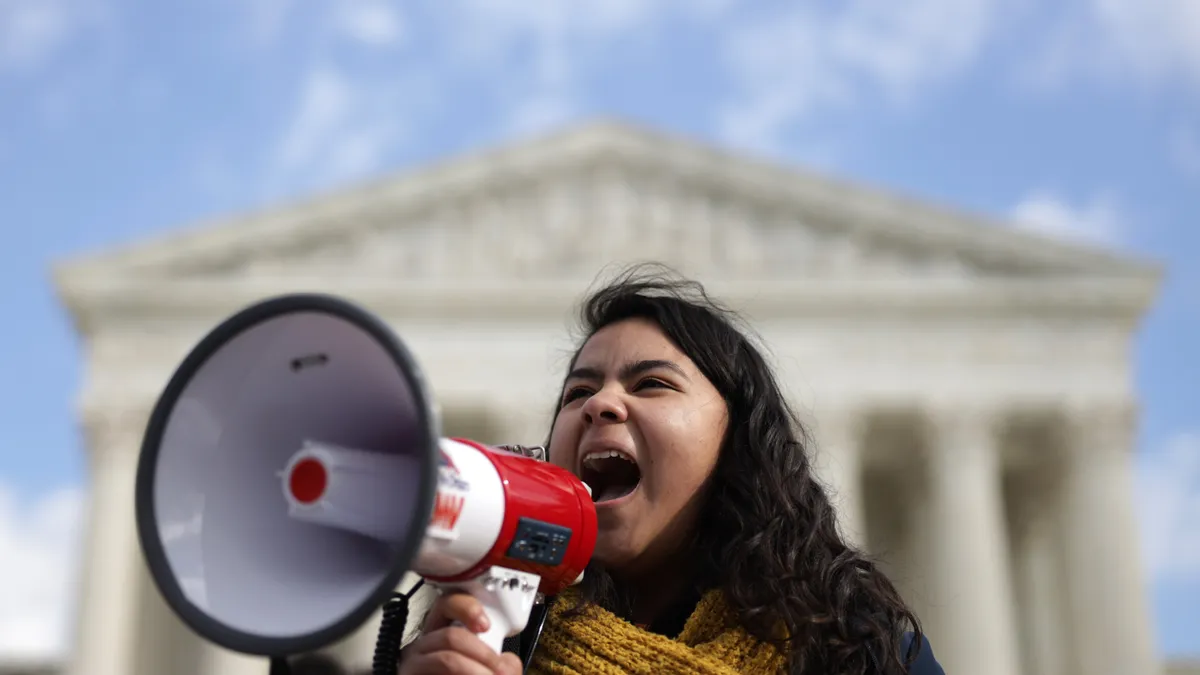The fate of the Deferred Action for Childhood Arrivals program was put into question once again this month. DACA, which provides protection from deportation to students and workers who were illegally brought to the U.S. as children, was ruled unlawful by a federal judge.
U.S. District Judge Andrew Hanen of the Southern District of Texas said that the Obama administration violated federal law by setting up the program through executive order. Hanen ordered the government to stop approving first-time applications for the programs. However, students already covered by DACA won't face immediate ramifications.
The ruling sent shockwaves through higher education.
"I think many of us on campus, including our students, have had a sense that with a new administration DACA is protected and we do not have to worry about DACA now — everything's OK," Elsa Núñez, president of Eastern Connecticut State University, said during a webinar Wednesday. "But that's not the case."
The ruling has ramifications for colleges and their current and prospective students. Roughly 216,000 college students are eligible for or are participating in DACA, according to a 2020 report from two immigration advocacy groups.
Many prospective students who don't yet have protected status under DACA but were counting on the program will no longer have access to in-state tuition prices or be eligible for some scholarship programs. And they will face uncertainty about their legal status once again after the Trump administration attempted to unravel the program in 2017.
Colleges should be ready to provide students with legal and mental health services, policy and higher ed experts said.
"For new initial applications that haven't yet been approved, for students who may have been waiting to gather up money for a DACA application … it's really devastating news," said Miriam Feldblum, co-founder and executive director of the Presidents' Alliance on Higher Education and Immigration.
What does the new order mean for students?
The ruling orders the U.S. Department of Homeland Security to no longer approve any first-time DACA applications. For some students, the loss of the program can be the difference between affording college or not attending.
That's because unauthorized immigrant students can't qualify for in-state tuition at some public colleges unless they're covered under DACA or a similar program granting temporary protection from deportation.
They also won't be able to access some scholarship programs without a Social Security number, for which the DACA program makes unauthorized immigrants eligible to apply, or a certain immigration status.
Students who've already received DACA approval won't be affected because the order still allows the government to approve renewal applications. And it shouldn't impact current recipients' ability to travel outside the country, Thomas Saenz, president and general counsel of the Mexican American Legal Defense and Educational Fund, said during a webinar Wednesday.
Still, the situation could change in the future, especially if the case reaches the U.S. Supreme Court, the judge noted in his order.
The ruling may also further rattle unauthorized students who lived in a state of uncertainty for years when the Trump administration sought to end the DACA program.
"Now it gets even worse," Feldblum said.
What can colleges do?
Colleges should take several steps to signal their support for unauthorized students, policy experts said, including reaching out to those potentially affected.
"The morale of students is down," said Gaby Pacheco, director of advocacy, development and communications at TheDream.US. But colleges can send messages "letting them know that we have their backs — that no matter what happens, these students belong in the classroom," she said.
Some colleges may be able to raise funds for scholarships for affected students or help pay a $495 fee DACA requires for renewals. Colleges can also host legal clinics on campus that unauthorized students can turn to for assistance.
Mental health services are key as well. Colleges should make it clear that counseling is open to all students regardless of their immigration status, said Juliana Macedo do Nascimento, senior advocacy manager at United We Dream.
"I know that as an undocumented student myself when I was going to school, I never knew that I could go to the health clinic on campus," she said.
Colleges should hire counselors that are culturally competent, Macedo do Nascimento said. Counselors should be familiar with programs such as DACA or Temporary Protected Status, which allows people to stay in the U.S. if it's not safe to return to their home countries.
"Not having to go into deep policy details just to explain to your therapist what that means would be a gamechanger for a lot of us," Macedo do Nascimento said.
Colleges urge Congress to pass immigration changes
The Presidents' Alliance is also urging Congress to provide a pathway to citizenship for immigrants illegally brought to the U.S. as children. So far, more than 500 college presidents and chancellors have signed onto the call.
Democratic lawmakers are attempting to pass immigration legislation by inserting it into a sprawling $3.5 trillion spending package. The changes would create a roadmap to legalization and green cards for "Dreamers," a term that commonly refers to young unauthorized immigrants brought here as children, and people covered under TPS, according to one lawmaker.
They hope to pass the package through a process known as budget reconciliation, which allows Congress to approve legislation with a simple Senate majority rather than the 60 votes usually needed to avoid a filibuster. The Presidents' Alliance has voiced its support for immigration changes through this path.
"We are trying to build urgency around the reconciliation process," Feldblum said. "We do believe that Democrats have to do it alone."























